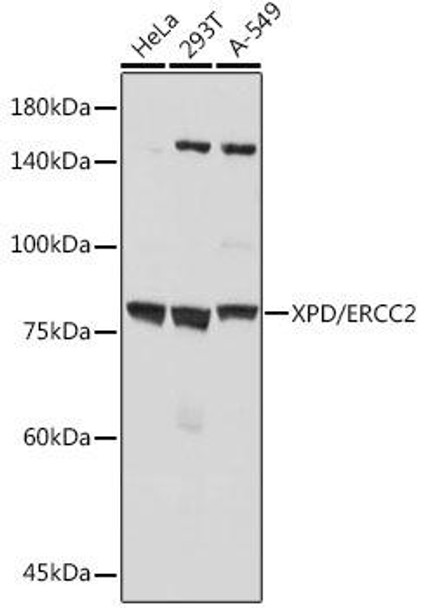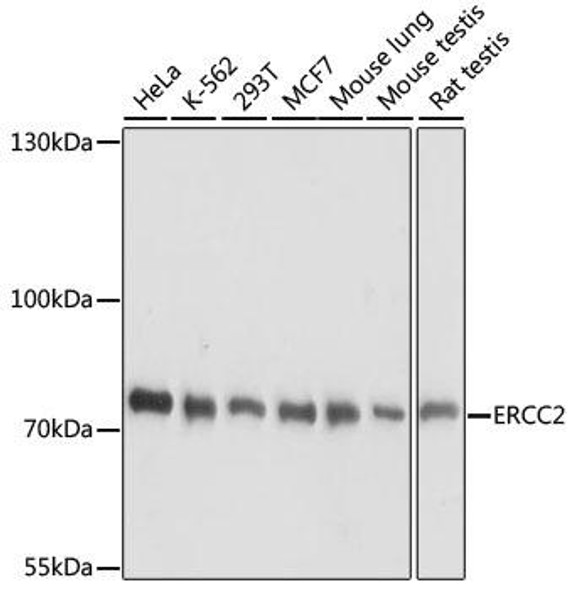Anti-XPD/ERCC2 Antibody (CAB19241)
- SKU:
- CAB19241
- Product type:
- Antibody
- Antibody Type:
- Monoclonal Antibody
- Reactivity:
- Human
- Mouse
- Rat
- Host Species:
- Rabbit
- Isotype:
- IgG
- Synonyms:
- ERCC2
- COFS2
- EM9
- TFIIH
- TTD
- TTD1
- XPD
- ERCC excision repair 2
- TFIIH core complex helicase subunit
Description
| Product Name: | XPD/ERCC2 Rabbit mAb |
| Product Code: | CAB19241 |
| Size: | 20uL, 50uL, 100uL |
| Synonyms: | ERCC2, COFS2, EM9, TFIIH, TTD, TTD1, XPD, ERCC excision repair 2, TFIIH core complex helicase subunit |
| Applications: | WB, IHC |
| Reactivity: | Human, Mouse, Rat |
| Host Species: | Rabbit |
| Immunogen: | Recombinant protein of human XPD/ERCC2. |
| Applications: | WB, IHC |
| Recommended Dilutions: | WB 1:500 - 1:2000 IHC 1:50 - 1:200 |
| Reactivity: | Human, Mouse, Rat |
| Positive Samples: | HeLa, 293T, A-549 |
| Immunogen: | Recombinant protein of human XPD/ERCC2. |
| Purification Method: | Affinity purification |
| Storage: | Store at -20°C. Avoid freeze / thaw cycles. Buffer: PBS with 0.02% sodium azide, 50% glycerol, pH7.3. |
| Isotype: | IgG |
| Sequence: | Email for sequence |
| Gene ID: | 2068 |
| Uniprot: | P18074 |
| Cellular Location: | Cytoplasm, Nucleus, cytoskeleton, spindle |
| Calculated MW: | 75kDa |
| Observed MW: | 80KDa |
| UniProt Protein Function: | ERCC2: ATP-dependent 5'-3' DNA helicase, component of the core- TFIIH basal transcription factor. Involved in nucleotide excision repair (NER) of DNA by opening DNA around the damage, and in RNA transcription by RNA polymerase II by anchoring the CDK-activating kinase (CAK) complex, composed of CDK7, cyclin H and MAT1, to the core-TFIIH complex. Involved in the regulation of vitamin-D receptor activity. Might also have a role in aging process and could play a causative role in the generation of skin cancers. Belongs to the helicase family. RAD3/XPD subfamily. One of the six subunits forming the core-TFIIH basal transcription factor which associates with the CAK complex composed of CDK7, CCNH/cyclin H and MNAT1 to form the TFIIH basal transcription factor. The interaction with GTF2H2 results in the stimulation of the 5'-->3' helicase activity. Interacts with Epstein-Barr virus EBNA2. |
| UniProt Protein Details: | Protein type:EC 3.6.4.12; Helicase Chromosomal Location of Human Ortholog: 19q13.3 Cellular Component: nucleoplasm; holo TFIIH complex; cytoplasm; spindle; nucleus; cyclin-dependent protein kinase activating kinase holoenzyme complex Molecular Function:ATP-dependent DNA helicase activity; protein C-terminus binding; RNA polymerase subunit kinase activity; DNA-dependent ATPase activity; protein binding; DNA binding; 4 iron, 4 sulfur cluster binding; metal ion binding; protein N-terminus binding; 5'-3' DNA helicase activity; ATP binding; protein kinase activity Biological Process: transcription from RNA polymerase II promoter; extracellular matrix organization and biogenesis; erythrocyte maturation; viral reproduction; apoptosis; positive regulation of viral transcription; positive regulation of transcription, DNA-dependent; protein amino acid phosphorylation; regulation of gene expression, epigenetic; bone mineralization; embryonic cleavage; post-embryonic development; chromosome segregation; mRNA capping; UV protection; negative regulation of gene expression, epigenetic; transcription-coupled nucleotide-excision repair; nucleotide-excision repair, DNA damage removal; aging; positive regulation of DNA binding; transcription initiation from RNA polymerase II promoter; in utero embryonic development; multicellular organism growth; nucleotide-excision repair, DNA incision; hair cell differentiation; transcription from RNA polymerase I promoter; RNA elongation from RNA polymerase I promoter; termination of RNA polymerase I transcription; DNA repair; hair follicle maturation; DNA duplex unwinding; cell proliferation; myelin formation in the central nervous system; spinal cord development; nucleotide-excision repair; RNA elongation from RNA polymerase II promoter; response to hypoxia; positive regulation of transcription from RNA polymerase II promoter; gene expression; response to oxidative stress; transcription initiation from RNA polymerase I promoter Disease: Cerebrooculofacioskeletal Syndrome 2; Xeroderma Pigmentosum, Complementation Group D; Trichothiodystrophy, Photosensitive |
| NCBI Summary: | The nucleotide excision repair pathway is a mechanism to repair damage to DNA. The protein encoded by this gene is involved in transcription-coupled nucleotide excision repair and is an integral member of the basal transcription factor BTF2/TFIIH complex. The gene product has ATP-dependent DNA helicase activity and belongs to the RAD3/XPD subfamily of helicases. Defects in this gene can result in three different disorders, the cancer-prone syndrome xeroderma pigmentosum complementation group D, trichothiodystrophy, and Cockayne syndrome. Alternatively spliced transcript variants encoding different isoforms have been found for this gene. [provided by RefSeq, Aug 2008] |
| UniProt Code: | P18074 |
| NCBI GenInfo Identifier: | 119540 |
| NCBI Gene ID: | 2068 |
| NCBI Accession: | P18074.1 |
| UniProt Related Accession: | P18074 |
| Molecular Weight: | |
| NCBI Full Name: | General transcription and DNA repair factor IIH helicase subunit XPD |
| NCBI Synonym Full Names: | ERCC excision repair 2, TFIIH core complex helicase subunit |
| NCBI Official Symbol: | ERCC2 |
| NCBI Official Synonym Symbols: | EM9; TTD; XPD; TTD1; COFS2; TFIIH |
| NCBI Protein Information: | general transcription and DNA repair factor IIH helicase subunit XPD |
| UniProt Protein Name: | TFIIH basal transcription factor complex helicase XPD subunit |
| UniProt Synonym Protein Names: | Basic transcription factor 2 80 kDa subunit; BTF2 p80; CXPD; DNA excision repair protein ERCC-2; DNA repair protein complementing XP-D cells; TFIIH basal transcription factor complex 80 kDa subunit; TFIIH 80 kDa subunit; TFIIH p80; Xeroderma pigmentosum group D-complementing protein |
| Protein Family: | TFIIH basal transcription factor complex helicase |
| UniProt Gene Name: | ERCC2 |
| UniProt Entry Name: | ERCC2_HUMAN |






